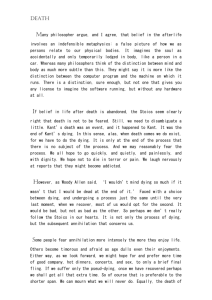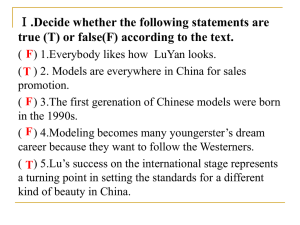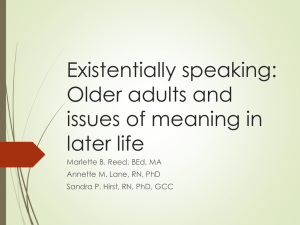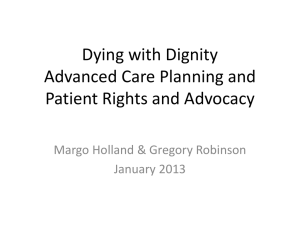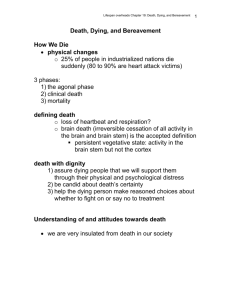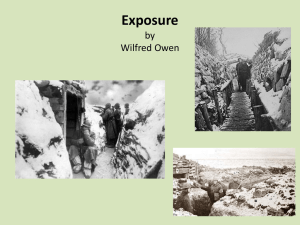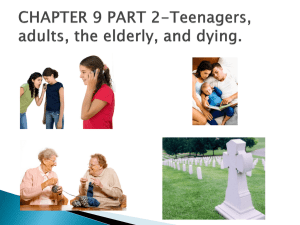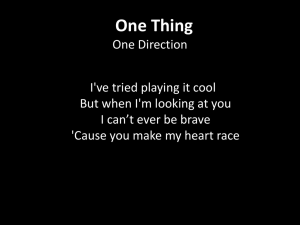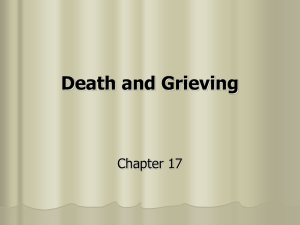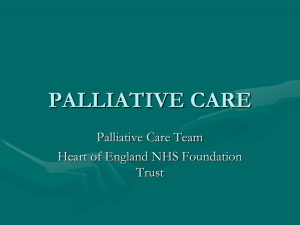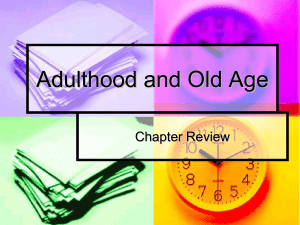Kirsten Schempp BQ project
advertisement
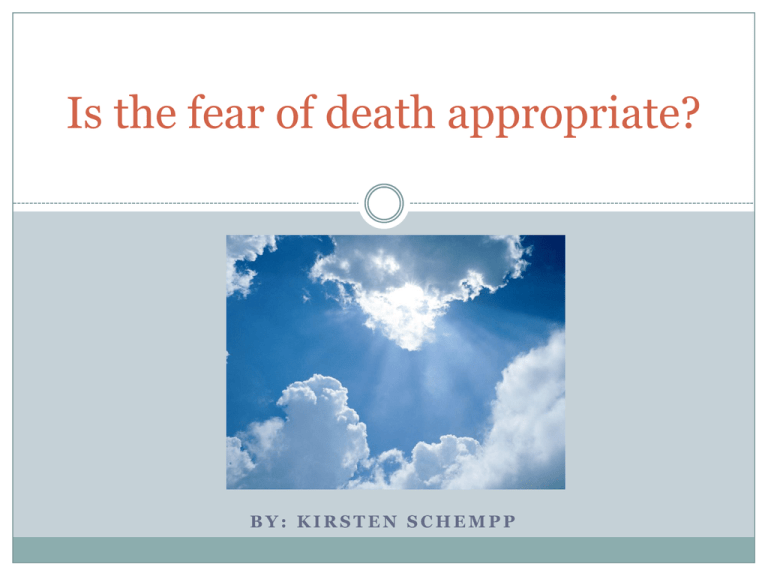
Is the fear of death appropriate? BY: KIRSTEN SCHEMPP Introduction Throughout this presentation we will be analyzing different resources regarding: What influences the common emotion of fear during death If the fear of death is in fact appropriate or inappropriate Views regarding death according to the dying Our Relationship with Death “A shaping power on thinking and behavior at all points in the lifespan” – Herman Feifel The way we anticipate death governs our “now” in an influential manner which is true to everyone despite any physical ailments or circumstances How we perceive death Death is one of the most overwhelming experiences we have as humans We tend to relegate death to the periphery of our lives keeping it “out of sight and out of mind” The words “dead” and “dying” are rarely used, we tend to use the phrases: “pass away”, “put to rest”, “remains” “Death challenges the idea that human life has meaning and purpose” The manner in which individuals respond to the challenge is intertwined with their cultural beliefs regarding death Our culture helps us deny, manipulate, distort, or camouflage death so it is less difficult to cope with The concept of “Death Anxiety” Robert Neimeyer and his colleagues proposed that the term “death anxiety” is understood as: “A shorthand designation for a cluster of death attitudes characterized by fear, threat, unease, discomfort, and similar negative emotional reactions, as well as anxiety in the psychodynamic sense as a kind of diffuse fear that has no clear object” More common in females, African Americans, youth, and non-religious individuals Neimeyer’s Conclusion Persons who accept both the dying process and the prospect of being dead one day as a natural part of their lives express less intense fear of dying and death Terror Management Theory People learn to assuage their fears of death by finding meaning in life and value in themselves, this meaning and value being provided by the culture into which people are socialized To cope with fear, individuals erect defenses against death awareness, these defenses are based in denial Fear of death seems to partly be a reflection of feeling cheated by life Some say death deprives us from the universe Terror Management Cont. Ernest Becker created the “four strands of emphasis” when discovering how people cope with an awareness of death….This is his theory: The world is a terrifying place The basic motivation for human behavior is the need to control our basic anxiety and deny the terror of death Because the terror of death is so overwhelming, we conspire to keep it unconscious Our heroic projects that are aimed at destroying evil have the paradoxical effect of bringing more evil into the world My Interview INFORMATION PROVIDED BY PROFESSOR HAMES (NURSING/ THANATOLOGY ) “Why do you feel that we, as Americans, are afraid of dying?” “It is a societal issue, we have a cultural mindset in the media that youth is beautiful and aging is bad. America is a death denying nation, which is considered a macro issue.” Why we fear death cont. THEN: “Generations ago, death was apart of our everyday lives and the dying were cared for within their homes by family members and the community. Burials were done in the backyards of the deceased or in the back of local churches.” NOW: “As the undertakers rise occurred, this profession caused families to become less involved and the deceased was taken away quickly. Now, it is common for post mortem care to be handled only by the undertaker instead of the family.” “The dying are often in the hospital during the time of their death instead of within the home.” Does culture influence views and emotions regarding death? “Human concerns regarding death are the same throughout related to our beliefs and values.” “Some have no fear, some welcome death, some believe in reincarnation, some believe we disintegrate into dust, and some believe we are only on Earth once.” “For example, the Hindu religion often shows the least amount of fear and anxiety as they believe in the afterlife.” How does the dying person often deal with the process of dying? “Their reaction often depends on whether the illness or ailment is chronic or acute (less than 6 months).” “The preparation for death and allowing time for the process is important in the emotional aspect of this process. If the patient has more time to prepare, they are often less avoidant and afraid.” “Often, the dying is not afraid to talk about death but it is difficult for them to find someone willing to talk with them about the transition.” “Do nurses or caregivers have a similar reaction?” “Quality of life is extremely important to the nurse and the art of the nurse’s therapeutic communication will influence the patient’s view of death.” “Since patients have trouble sometimes finding family members to discuss death with them, it is important for the nurse to raise the concept with the patient. This will enrich both the patient and nurse’s experience, resulting in an enhanced relationship due to the nurses honesty.” Let’s Discuss Professor Shelly Kagan’s view on the fear of death PROFESSOR SHELLY KAGAN IS A PHILOSOPHY PROFESSOR AT YALE UNIVERSITY IN CONNECTICUT HTTP://WWW.ACADEMICEARTH.ORG/LECTUR ES/FEAR-OF-DEATH “The meaning of life is the fact that it ends” One of the most common reactions to death is fear but is it appropriate and reasonable? Emotions have requirements to make sense and be rational and ultimately be appropriate Conditions for fear In order to be afraid of something, the thing we are afraid of has to be bad- we can not fear something pleasurable There has to be a non-negligible chance of the bad object coming to you: the fear is not appropriate if the occurrence is unlikely We need to have a certain amount of uncertainty in order to have the fear be appropriate: if we knew exactly what something felt like or the intensity of it then fear would be inappropriate Fear cont. We may be certain that death is going to come but uncertain as far as when it will actually come in our life time- will it come soon or in the far future? Our fear may be related to the uncertainty that comes with death- will we die too soon or will it be painful? Kagan believes the fear needs to be proportional to the likelihood of death Let’s take a look at the short novel “Final Gifts” BY: MAGGIE CALLANAN AND PATRICIA KELLEY BASED ON HOSPICE NURSE’S STORIES AND THEIR EXPERIENCES What the dying person feels Anger may grow out of fear Most people have at least some fear of dying When most people discuss their fear they state, “Im not afraid to be dead, it’s what happens before I die that bothers me” Many ask, “Will it hurt?” and “What will it be like?” Fears often surface in the middle of the night An Example The nurses explain an interaction they had with a patient named Helen. Helen asked: “What’s dying like?” then quickly added, “No, don’t tell me” as she feared the answer might make her anxiety worse. The nurses simple explanation relieved her anxiety because what she imagined was worse than the reality. Some question their religious beliefs and fear if God will take them to heaven “I’ve always believed in God; faith has always been a very important part of my life but now I find myself wondering if it’s all true, whether God will really be there when I die. What if there’s nothing after all?” Nagel’s view of death Most people hope that death is neither premature nor painful Life is all we have and the loss of it is the greatest loss we can sustain If death is evil it can not be because of the positive features but only because of what it deprives us of Death is a mysterious and terrifying prospective state because we are unable to imagine what it is like to be dead Nagel proposes the conflict of whether a “premature” death is more of a loss versus a death of an 80 year old man….is it? Is immediate death the same as immediate death followed by a coma? We are attracted to the idea of long term freezing to resume conscious life because we consider it to be a continuation of our present life It is not possible to imagine within the mind what death is like, therefore we are afraid of it My opinion and results I believe that we are often afraid of death because of the uncertainty death presents to us. As a nation, we push death out of our minds and rarely accept this occurrence when we are faced with it. We are uncertain of how our death will carry out, the age we will approach death, and what it will feel like. I don’t believe death is necessarily “bad” because for many, it provides peace and rest especially for those suffering from a terminal illness. Therefore, I don’t think it is appropriate to fear death solely because it is uncertain. After reading the book, “Final Gifts”, my eyes were opened to realize that for many, death is not painful nor frightening. Therefore, when loved ones are dying we should make ourselves available to discuss this process openly without hesitation. We should be able to carry out our everyday lives without hiding in the fear of death. Works Cited Callanan, M., & Kelley, P. (1992). Final gifts . New York, New York: Bantam Dell DeSpelder, L., & Strickland, A. (2011). The last dance. (9th ed.). New York, New York: McGraw-Hill Hames, C. (2013, April 05). Interview by K Schempp []. Why are we afraid of death?. Nagel, T. (1979). Death. Retrieved from http://dbanach.com/death.htm
